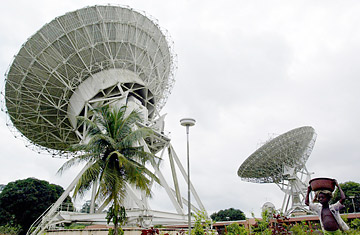
Satellite dishes at a telecommunications center in the Ivory Coast
(2 of 2)
And in those areas where it's not feasible to extend fiber cables — sparsely populated rural regions, say — O3b's satellite network will shift information around wirelessly, closing the digital divide still further. "Perhaps half of the entire African population does not live in major cities," says Brian Neilson, research director at BMI-TechKnowledge, a South Africa–based telecom consultancy, who adds that for O3b, "there is a clear gap-closing opportunity."
The success of any such moves, though, hinges on a healthy demand for available services. The incredible spread of cell-phone use in Africa offers plenty of encouragement. The continent's mobile market has expanded faster than that of any other region over the past five years, averaging annual growth of almost 65%. Revenue generated by each of Africa's almost 300 million cell-phone users is three times higher than in Bangladesh, India or Pakistan. And users have been quick to exploit devices for commercial gain. Ghana-based TradeNet matches buyers and sellers of crops by circulating details via SMS of what each is offering to trade; many poor farmers in Tanzania rely on cell phones to gather real-time market prices for their goods. What's more, evidence of surging demand for broadband in other developing countries bodes well for those in Africa. Subscriber numbers in India, for instance, are growing at almost 50% a year.
Still, whizzy schemes to connect millions of Africans can't guarantee users access to the services they need the most. Most of the $23 billion poured into sub-Saharan Africa's information and communication technology (ICT) infrastructure between 1996 and 2006 came from the private sector. In one sense, that's positive. Those telecom firms aren't diverting money away from other areas no less hungry for investment. But, says Raul Zambrano, ICT adviser in the United Nations Development Program's Bureau for Development Policy, "it doesn't address the issue of development." Just as important as connecting poor people to the Web: giving them more rapid access to birth certificates and government health and education services. So while O3b's plan, for one, is "a great start," Zambrano says, "is this sort of investment going to help poor people get services? I think the answer is up in the air ... Who's going to do that? Not Google, not the telecoms," he says. "We need to have the political will to address those gaps through technology." Greg Wyler, founder of O3b, acknowledges that effective IT infrastructure requires "multiple components" but insists that O3b's plans are a "critical" part of that. If you're reading this in Africa, you probably don't need Wyler to tell you that.
(See photos of struggle and triumph in Africa here.)